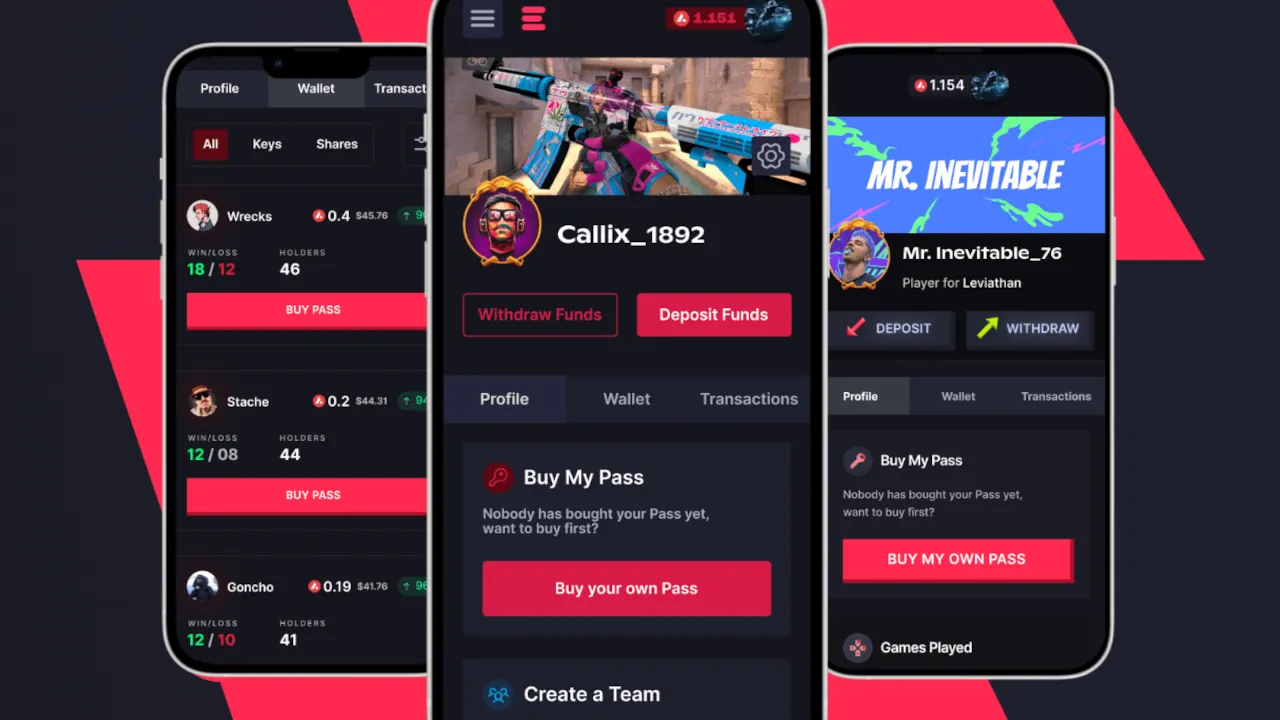Will crypto be the solution to the esports industry’s growing pains? We’ve seen various attempts over the last few years, but now Avalanche-based app Battle.tech has a novel idea: pairing the concept of SocialFi with gaming.
While it has no official connection to Friend.tech—last year’s buzzy app that renewed excitement around SocialFi after social tokens failed to take off—the inspiration behind Battle.tech is unmistakable. It plays around with the same kind of “keys” tied to a notable user or influencer, only this time through the lens of gaming.
Imagine watching semi-pro matches in a competitive game and spotting a rising star that you think could hit it big. If they’re on Battle.tech, then you’d be able to buy a tokenized “player pass” that has its value tied to their real-world success. And not only do you support the player, but you could benefit by reselling the pass should they hit it big.
“It gives two communities the interesting ability to come together,” explained Ryan “Wrecks” Day, CEO of Owned, the creator of Battle.tech. “One is players who are looking to make some money playing video games, which is always fun. And then backers get the ability to speculate on potentially something new.”
That’s the premise of Battle.tech, which launched Wednesday on the Avalanche blockchain and is beginning with support for Counter-Strike 2, the popular squad-based PC shooter. Owned is part of Unix Gaming, which late last year put on a series of competitions under the Game League banner that awarded $1 million worth of prizes across numerous games.
Billed as the “Kickstarter for esports,” Battle.tech lets players import their gaming history from PC platforms like Steam and FACEIT—demonstrating proof of their prowess—to create a player pass. From there, backers can buy the tokens and hold onto them, following players through tournaments as they hopefully rise up the ranks and make an impact in the esports world.
It's cool seeing our FaceIt clan with 1700 players, 11 concurrent matches, and 9 teams waiting to play.
These traditional gamers now have wallets and are getting paid out in $AVAX.
More fun things to come. pic.twitter.com/iXJ7iwnm9t
— Wrecks (@WrecksGG) February 2, 2024
Esports team organizations and other startups have dabbled in various crypto activations over the years, including naming rights deals and jersey sponsorships, NFT collectibles, fan tokens, and more. But it would be hard to blame any prominent esports teams from treading carefully following the late 2022 implosion of FTX and the brutal bear market that followed.
Day said that teams he’s spoken with are watching closely, but he expects that Battle.tech can have a more immediate impact at lower levels of competition as well as in emerging economies.
As some esports teams and tournament operators scrap feeder teams and leagues to save cash, there are fewer meaningful opportunities for up-and-coming players to gain traction and begin their hopeful ascent into the big leagues.
Battle.tech, in Day’s view, can help those players gain a foothold, build an audience, make a little money, and hopefully use that all as a springboard that benefits backers in the process. And while Battle.tech is starting with only Counter-Strike 2 support, it plans to expand into Dota 2 and other titles, including notable crypto games.
There’s just one big potential hitch: SocialFi platforms haven’t typically had much staying power. Friend.tech on Ethereum layer-2 scaling network Base had a big moment last summer, but daily transactions have since fallen by more than 99%. Similar projects on other chains caught a whiff of buzz, but haven’t maintained the hype.
What will make Battle.tech any different?
Day says Owned has a couple ideas to help make this gaming riff on SocialFi more than a flash in the pan. One is the ability for players to form teams on the platform, so backers can buy into squads instead of solely individuals. And the fact that pass value is tied to competitive performance could give prices a more consistent anchor.
Whether those mechanics pan out in practice remains to be seen, but at least for now, Battle.tech looks like an intriguing bridge between Web2 gaming and Web3 functionality. The app is backed by an Avalanche subnet, but it sounds like Owned is trying to make onboarding relatively straightforward before layering in deeper crypto elements.
“We start with what an 18-year-old Counter-Strike 2 player from France is going to experience,” Day told Decrypt’s GG, “and then it’s like: How do we build back from there, but introduce blockchain elements, sovereignty, and all the stuff that people believe in?”

